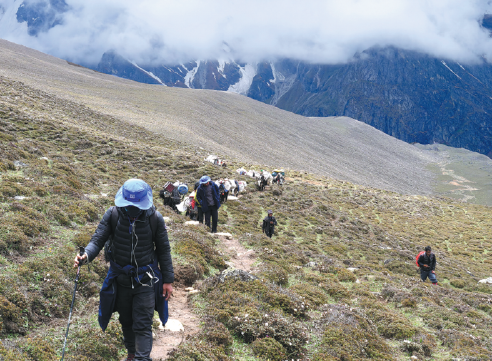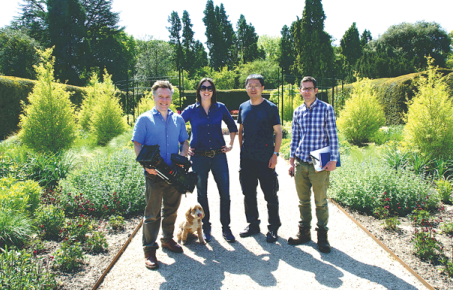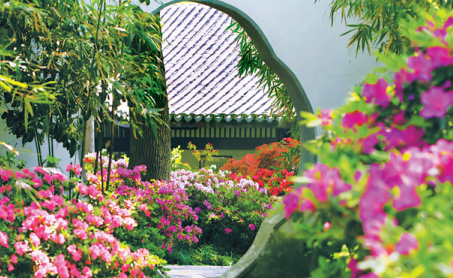Eastern gardens grow West
A new Chinese TV documentary traces the journey of flowering plants from China to places afar, Xu Fan reports.

In China, flowers offer splendid sights in parks, inspire poetry and are used to make tea and food. In addition, flowers have gone across raging seas to create their own legends in some of Europe's most prestigious gardens.
The five-episode Chinese documentary series, The Signature of Flowers, which ran on CCTV-1 and CCTV-9 from May 1 to 5, revisits the historical chapters about some plants from China taken overseas a few centuries ago, and traces the latest discoveries by top domestic botanists.
As the country's first such horticulture documentary, the production was shot over two years, with its crew traveling to 21 provinces and regions in China and nearly 20 cities in Britain, France, the United States, Japan and the Netherlands.
Respectively focused on camellias, rhododendrons, Chinese roses, chrysanthemums and peonies, each episode shows scenes not filmed by domestic television producers earlier.
Such shots include a 15-day filming of the flowering process of xueta (snow tower), a variety of camellia that is famous in China, and an expedition team's trek to the highlands of the Tibet autonomous region for rare rhododendrons.
Huang Yinghao, the chief director of the series, says he first had the idea to produce the documentary in 2017, when a friend presented him with US writer Michael Pollan's The Botany of Desire: A Plant's-Eye View of the World.
"Pollan had a fresh perspective on plants," says Huang, adding that the book taught him to adopt an unprecedented way to observe plants.
"Flowers have been on Earth longer than humans. It's interesting to imagine how they think about us, who appeared on the planet much later," he says about his reaction after first reading the book.
With the question haunting his mind, Huang and his TV crew met Zhou Xiaolin, a self-made horticulturist who has leased a valley covering 800,000 square meters to plant various species of flowers on the outskirts of Chengdu in Sichuan province.
"The nights in the valley are tranquil but also full of vitality. One night in a cabin inside Zhou's garden, I shaped the draft of this documentary," Huang says.
He had planned to collect interesting stories about flowers that have bridged the East and West by tracing the plants' native areas in China and their presence in foreign lands.
Huang moved with his family to Paris for several months, where he read a lot of books and scientific journals, and watched documentaries.
He also discovered that most British gardens had Chinese plants.
Traveling from Paris to London by train, he interviewed some British botanists and gardeners during his stay in France.
From Sandra Knapp, a botanist at the Natural History Museum, to Richard Deverell, director of the Royal Botanic Gardens, Kew, and a few experts, Huang and his team heard stories about the different plant species taken from China to the United Kingdom.
The UK's "plant hunters" were controversial explorers, who sometimes risked their own safety to find exotic plants in other countries and transform gardens in the UK between the 17th and 19th centuries.
Among them was Scottish surgeon James Cunningham, the first European who sailed around nine months to arrive in Xiamen, Fujian province, and took back many botanical specimens, including camellias, to the British Isles in 1669.
George Forrest, another British planter, is featured in the documentary.
From 1904 to 1932, he undertook seven expeditions to forests and mountains in China, and returned to the UK with more than 30,000 dried plant specimens, as well as over 1,000 living plants and more than 10,000 seed samples.
Before that Britain had only 1,500 native plants, according to the documentary's producers.
Huang, who is in his 40s and made the documentary over three years, says he believes Forrest's collection opened up British knowledge about plants in China, particularly rhododendrons, and helped British botanists to take the lead in research.
When Huang was shooting an episode of the series in Europe, his colleague, Han Zhen, director of the second episode, was trekking with his team to Karma Valley on the eastern slopes of Qomolangma, or Mount Everest, in 2018.
"It was in the middle of June, when most rhododendrons (in warmer areas) were bidding farewell to their flowering phase. The rhododendrons in the Tibetan highlands had just started to bloom," Han says about the trip.
It was the most expensive shoot. Han had 13 yaks transporting tents and supplies for the team's 10-plus members.
In nine days, they hiked nearly 120 kilometers in the valley, climbing several peaks every day, with the highest altitude reaching around 5,300 meters.
"Every morning after breakfast, we embarked on the trek, taking with us simple food like biscuits and eggs," Han recalls.
Two of the cameramen experienced altitude sickness-they even tied scarves around their heads to ease the pain.
Han vomited several times and could barely walk on his own on the last day of the trek.
But the arduous journey was worthwhile. They shot the meconopsis tibetica, one of the world's most exotic flowers, in the valley.
Han is now staying home because of the COVID-19 pandemic.
He says he has spare time to plant rhododendron seeds given to him by Chinese American horticulturalist Shen Yinchun, son of the late Shen Yuanru, known in China as the "king of orchids", who imported exotic breeds from Japan and Belgium to cultivate hybrid flowers in his garden in Wuxi, Jiangsu province, in the 1920s.
"Shen Yinchun is in his 80s. He lives alone in the United States, with flowers as his only company. Every day, he waters the plants and records the growth in his garden," says Han.
"Sometimes, he places a blanket on the ground, lies on it and takes photos of saplings, even those less than 10 centimeters tall."
The Signature of Flowers marks Han's first attempt at directing a documentary on plants, and it has changed his view of the world.
"Gardening is a way to understand time. You have to slow down to taste the beauty of life and nature," Han adds.




Today's Top News
- Mideast on edge as Iran leader slain
- The day when Dubai was on tenterhooks
- Spring Festival concert in London bridges cultures
- Military adventurism in the Middle East foolhardy gambling that escalates tensions
- China condemns killing of Iran's Khamenei
- CPPCC unveils agenda of the annual session





























